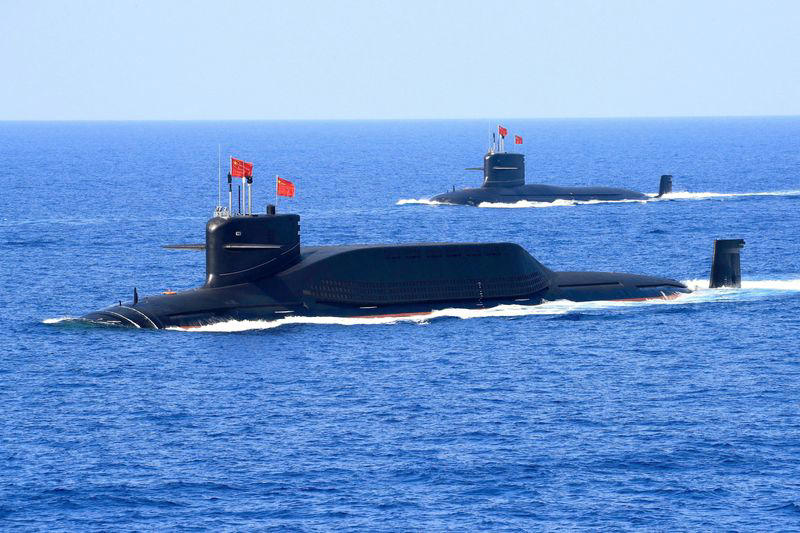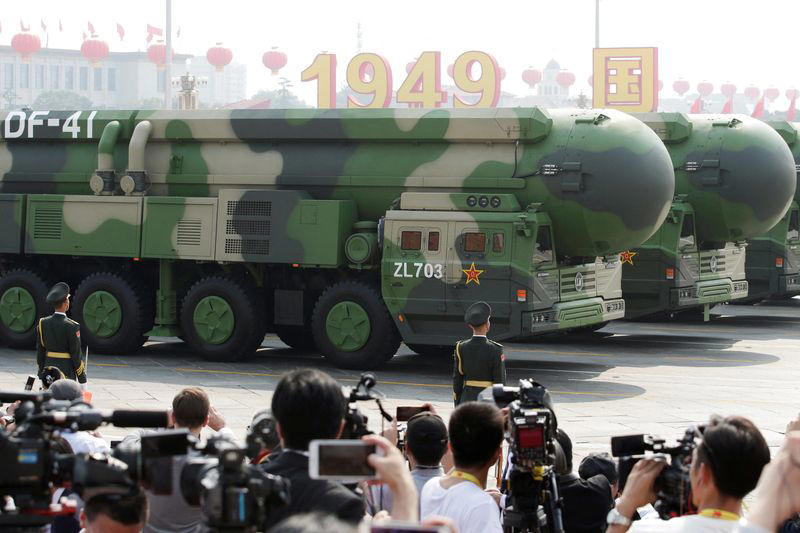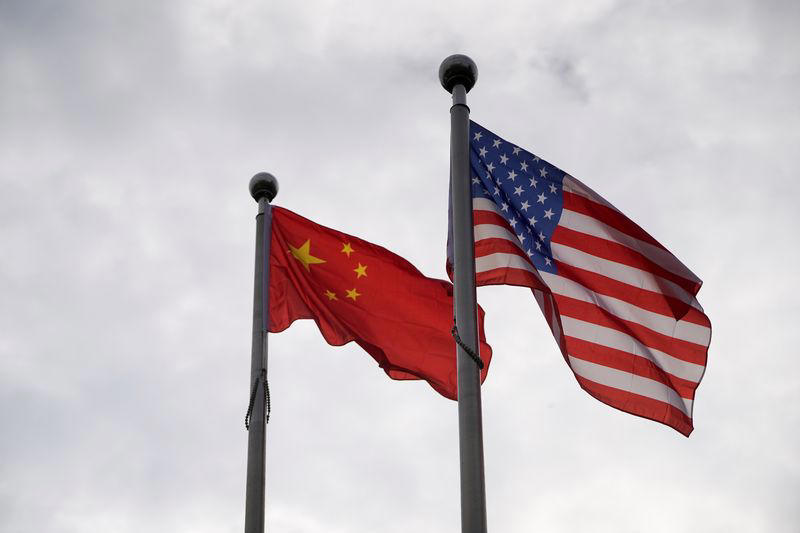Exclusive-U.S. and China hold first informal nuclear talks in 5 years, eyeing Taiwan

FILE PHOTO: A nuclear-powered Type 094A Jin-class ballistic missile submarine of the Chinese People's Liberation Army (PLA) Navy is seen during a military display in the South China Sea April 12, 2018. Picture taken April 12, 2018. To match Special Report CHINA-ARMY/NUCLEAR REUTERS/Stringer/File Photo
HONG KONG (Reuters) - The United States and China resumed semi-official nuclear arms talks in March for the first time in five years, with Beijing's representatives telling U.S. counterparts that they would not resort to atomic threats over Taiwan, according to two American delegates who attended.

FILE PHOTO: Military vehicles carrying DF-41 intercontinental ballistic missiles travel past Tiananmen Square during the military parade marking the 70th founding anniversary of People's Republic of China, on its National Day in Beijing, China October 1, 2019. REUTERS/Jason Lee/File Photo
The Chinese representatives offered reassurances after their U.S. interlocutors raised concerns that China might use, or threaten to use, nuclear weapons if it faced defeat in a conflict over Taiwan. Beijing views the democratically governed island as its territory, a claim rejected by the government in Taipei.

FILE PHOTO: Chinese and U.S. flags flutter outside a company building in Shanghai, China November 16, 2021. REUTERS/Aly Song/File Photo
"They told the U.S. side that they were absolutely convinced that they are able to prevail in a conventional fight over Taiwan without using nuclear weapons," said scholar David Santoro, the U.S. organiser of the Track Two talks, the details of which are being reported by Reuters for the first time.
Participants in Track Two talks are generally former officials and academics who can speak with authority on their government's position, even if they are not directly involved with setting it. Government-to-government negotiations are known as Track One.
Washington was represented by about half a dozen delegates, including former officials and scholars at the two-day discussions, which took place in a Shanghai hotel conference room.
Beijing sent a delegation of scholars and analysts, which included several former People's Liberation Army officers.
A State Department spokesperson said in response to Reuters' questions that Track Two talks could be "beneficial". The department did not participate in the March meeting though it was aware of it, the spokesperson said.
Such discussions cannot replace formal negotiations "that require participants to speak authoritatively on issues that are often highly compartmentalized within (Chinese) government circles," the spokesperson said.
Members of the Chinese delegation and Beijing's defence ministry did not respond to requests for comment.
The informal discussions between the nuclear-armed powers took place with the U.S. and China at odds over major economic and geopolitical issues, with leaders in Washington and Beijing accusing each other of dealing in bad faith.
The two countries briefly resumed Track One talks over nuclear arms in November but those negotiations have since stalled, with a top U.S. official publicly expressing frustration at China's responsiveness.
The Pentagon, which estimates that Beijing's nuclear arsenal increased by more than 20% between 2021 and 2023, said in October that China "would also consider nuclear use to restore deterrence if a conventional military defeat in Taiwan" threatened CCP rule.
China has never renounced the use of force to bring Taiwan under its control and has over the past four years stepped up military activity around the island.
The Track Two talks are part of a two-decade nuclear weapons and posture dialogue that stalled after the Trump administration pulled funding in 2019.
After the COVID-19 pandemic, semi-official discussions resumed on broader security and energy issues, but only the Shanghai meeting dealt in detail with nuclear weapons and posture.
Santoro, who runs the Hawaii-based Pacific Forum think-tank, described "frustrations" on both sides during the latest discussions but said the two delegations saw reason to continue talking. More discussions were being planned in 2025, he said.
Nuclear policy analyst William Alberque of the Henry Stimson Centre think-tank, who was not involved in the March discussions, said the Track Two negotiations were useful at a time of glacial U.S.-Chinese relations.
"It's important to continue talking with China with absolutely no expectations," he said, when nuclear arms are at issue.
NO FIRST-USE?
The U.S. Department of Defense estimated last year that Beijing has 500 operational nuclear warheads and will probably field more than 1,000 by 2030.
That compares to 1,770 and 1,710 operational warheads deployed by the U.S. and Russia respectively. The Pentagon said that by 2030, much of Beijing's weapons will likely be held at higher readiness levels.
Since 2020, China has also modernised its arsenal, starting production of its next-generation ballistic missile submarine, testing hypersonic glide vehicle warheads and conducting regular nuclear-armed sea patrols.
Weapons on land, in the air and at sea give China the "nuclear triad" - a hallmark of a major nuclear power.
A key point the U.S. side wanted to discuss, according to Santoro, was whether China still stood by its no-first-use and minimal deterrence policies, which date from the creation of its first nuclear bomb in the early 1960s.
Minimal deterrence refers to having just enough atomic weapons to dissuade adversaries.
China is also one of two nuclear powers - the other being India - to have pledged not to initiate a nuclear exchange. Chinese military analysts have speculated that the no-first-use policy is conditional - and that nuclear arms could be used against Taiwan's allies - but it remains Beijing's stated stance.
Santoro said the Chinese delegates told U.S. representatives that Beijing maintained these policies and that "'we are not interested in reaching nuclear parity with you, let alone superiority.'"
"'Nothing has changed, business as usual, you guys are exaggerating'," Santoro said in summarising Beijing's position.
His description of the discussions was corroborated by fellow U.S. delegate Lyle Morris, a security scholar at the Asia Society Policy Institute.
A report on the discussions is being prepared for U.S. government but would not be made public, Santoro said.
'RISK AND OPACITY'
Top U.S. arms control official Bonnie Jenkins told Congress in May that China had not responded to nuclear-weapons risk reduction proposals that Washington raised during last year's formal talks.
China has yet to agree to further government-to-government meetings.
Bejing's "refusal to substantively engage" in discussions over its nuclear build-up raises questions around its "already ambiguous stated "no-first-use" policy and its nuclear doctrine more broadly," the State Department spokesperson told Reuters.
China's Track Two delegation did not discuss specifics about Beijing's modernisation effort, Santoro and Morris said.
Alberque of the Henry Stimson Centre said that China relied heavily on "risk and opacity" to mitigate U.S. nuclear superiority and there was "no imperative" for Beijing to have constructive discussions.
China's expanded arsenal - which includes anti-ship cruise missiles, bombers, intercontinental ballistic missiles and submarines - exceeded the needs of a state with a minimal deterrence and no-first-use policy, Alberque said.
Chinese talking points revolved around the "survivability" of Beijing's nuclear weapons if it suffered a first strike, said Morris.
The U.S. delegates said the Chinese described their efforts as a deterrence-based modernisation programme to cope with developments such as improved U.S. missile defences, better surveillance capabilities, and strengthened alliances.
The U.S., Britain and Australia last year signed a deal to share nuclear submarine technology and develop a new class of boats, while Washington is now working with Seoul to coordinate responses to a potential atomic attack.
Washington's policy on nuclear weapons includes the possibility of using them if deterrence fails, though the Pentagon says it would only consider that in extreme circumstances. It did not provide specifics.
One Chinese delegate "pointed to studies that said Chinese nuclear weapons were still vulnerable to U.S. strikes - their second-strike capability was not enough", said Morris.
(Reporting by Greg Torode in Hong Kong, Gerry Doyle in Singapore and Laurie Chen in Beijing; Additional reporting by Michael Martina in Washington; Editing by Katerina Ang)
